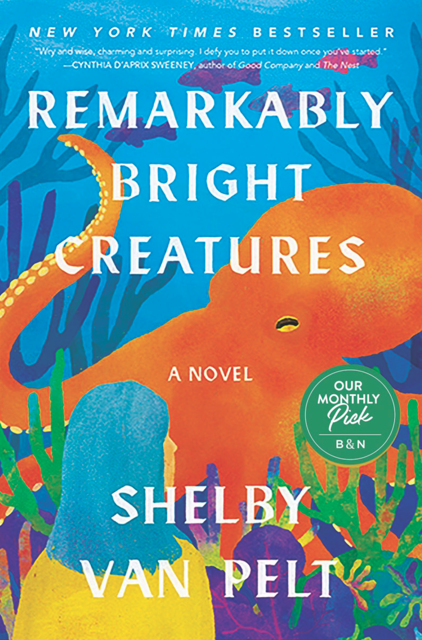Everybody can feel out of place at times, including bestselling authors. Just ask Shelby Van Pelt, author of the smash hit Remarkably Bright Creatures. Remarkably Bright Creatures is Van Pelt’s debut novel, written in her home in the Chicago suburbs during the pandemic and has been on the New York Times bestseller list multiple times. The novel was so successful that Netflix has commissioned a film adaptation with Sally Fields set to star in the lead role. And yet, even for an author such as Van Pelt, who has gone from an unknown writer to one of the hottest names in the literary world, those feelings of self-doubt still remain. “What I would like to say is that I have more confidence in my writing now than I did before the book was published,” says Van Pelt. “I don’t know if that’s actually true. What I do know is that I certainly still have my days where I struggle and stare at a blank page and think that everything I put out is worthless—I don’t know any writer who doesn’t have those days once in a while. I am, however, more confident in the fact that I know it will get there than I was before.”
On March 14, Van Pelt came to Sarasota for the Sarasota County Libraries and Historical Resources One Book One Community event to speak on Remarkably Bright Creatures and her career path. Van Pelt’s journey is particularly inspiring for emerging writers—a 2002 graduate of Claremont McKenna College, Van Pelt worked as a financial consultant for the majority of her career, dabbling in flash fiction and short story writing before taking the creative plunge during the pandemic. Van Pelt advises emerging writers looking to break into their first major project to seek out the help of others.
“I don’t know that anyone ever does it alone, whether you’re writing fiction or nonfiction. When I was working on my query letter to send to publishers for this book, I was working really closely with a group of writers who were also querying their own novels. We supported each other through the second, fifth, tenth versions of these query letters,” says Van Pelt. “I had two major communities along the way—one from a continuing education class and the other was an online group from short story contests. Having that community, in addition to being necessary, just makes the whole process a lot more fun.”
Remarkably Bright Creatures is a story born out of the mundane, rooted in Van Pelt’s upbringing in Tacoma, Washington. The novel follows Marcellus, a giant Pacific octopus languishing in his detainment in the fictional Sowell Bay Aquarium off Puget Sound, and the unlikely friendship that he strikes up with Tova, a 70-year-old widow who works as the night janitor at the aquarium. Remarkably Bright Creatures explores the lives of characters that are all stuck in some way or another. Tova remains stuck in her grief over the disappearance of her son Erik, some 30 years before, Marcellus is, despite his best efforts, stuck in the aquarium and Cameron, a 30-something ne’er-do-well finds himself stuck in life, searching for his estranged father in Sowell Bay. Van Pelt, who spent significant time at her local aquarium as a child, was inspired to create Marcellus from a viral video of an octopus escaping its tank. “I don’t know that I’ve ever gotten a story idea by searching for one,” says Van Pelt. “The idea for Remarkably Bright Creatures popped out at me from a random YouTube video and the idea for the book I’m working on now came out of a newspaper article. There’s some sort of spark that just happens where you go, ‘Wow that’s a great story. I’d like to take that and tell that story.’” While Van Pelt had a certain level of familiarity with the fictional world of Sowell Bay and life on the Puget Sound, there were less overt ties to that of Tova, a widow paralyzed in grief or Cameron, a young man who just couldn’t seem to get his life on track. Creating the interconnected, small-town familial web of Remarkably Bright Creatures came from Van Pelt looking inwards.
“The adage of write what you know works, but you can also swap it with write what you’re curious about or write what you fear. When I think about where these plot lines and characters come from, so much of it comes from my own anxiety,” says Van Pelt. “I always have this little part of my brain that’s looking for the worst case scenarios and sometimes you just let them sit in the driver’s seat for a while and explore them. Obviously I’m not an octopus. I’m not a 70-something woman or a 30-year-old man, but at the same time I’m like all of them in some way in how they process their loneliness, their fears, their anxiety.”










